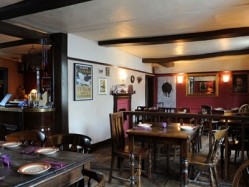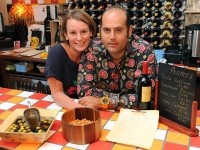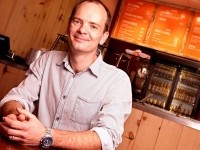Finding finance in hospitality: Using your own funds

Fitting out and running a boutique hotel will inevitably cost more than opening a 30-cover neighbourhood restaurant, but in most cases business owners will need to raise a five, if not six figure sum before setting up or opening that next site.
Not everyone, however, can, or even wants to borrow huge amounts of cash to realise their dream, so what do you do if you have a great idea for a new business with little equity behind you?
As we’ll see in the examples below, Emma and Alfonso Yufera-Ruiz co-owners of the Authentic Tapas Group and Jan Rasmussen of Mission Burrito, started their concepts with just a few thousand pounds of their own money behind them, yet now operate three and five sites respectively.
Setting up and growing a business without borrowing from the bank, giving away a chunk to a private equity firm or asking outsiders for help is tough, but not impossible, as these case studies show, but if you’re considering this option, you should expect to make compromises and work incredibly hard says Emma Yufera-Ruiz.
Self-funding can also be a slower option for growth, says Justin Randall of accountancy firm Jeffreys Henre, as you’ll need to be in a profitable position before you can consider it.
“You’ve got to be prepared to be in for a long ride and remember to re-invest profit back into the business if you want to secure your future. You’ll need that buffer if you want to expand,” he says.
Business: Authentic Tapas Group
Owners: Emma and Alfonso Yufera-Ruiz
Start-up capital: £6k
Growth: From one to three restaurants in three years.
Their story: In 2009 Alfonso Yufera-Ruiz, a chef from Spain and his, then partner, Emma, were looking to realise their dream of opening a tapas restaurant in the Midlands, but Emma was a recent graduate and Alfonso had moved jobs too frequently to be considered for a loan, so they had to rely on their combined savings of £6k to get their project off the ground.
Birmingham had been the preferred location for the couple’s first venture, but they recognised that the city’s high rents were beyond their means, so when they made the chance discovery of an abandoned first-floor Italian restaurant in the Shropshire town of Bridgnorth, they made enquiries and eventually managed to take a look.
“It was totally unreal. It had been closed for nearly two years, but it looked like the previous owner had just left it at the end of service,” says Emma “The tables were still laid, wine was still in glasses and food was still in the (turned off) fridges, but the fact that the previous owner had done a runner went in our favour, because we had all the equipment there ready.”
Start-up
The Yufera-Ruiz’s £6k went towards their rent deposit, cleaning materials and tins of paint. They used the rest of the money to buy limited stock and a box of lager from the supermarket for their first night of business.
Casa Ruiz opened a week after the couple acquired the 36-cover site. Emma continued to work during the day as a recruitment consultant to pull in a regular salary, but would join Alfonso at the restaurant in the evening to work front-of-house.
“The restaurant just worked really, really well. Our food is authentic fresh homemade tapas and our service is really friendly. It was cheap to run and I think it just filled a niche,” says Emma, who believes that a little bit of luck, combined with perseverance and hard work helped them set up and grow their business which now includes three restaurants and a supplier of Spanish ingredients to the trade.
“We put a lot of effort into our service and made it really welcoming so that people were really forgiving when we started out,” she adds.
“We would probably not have been able to do it if we hadn’t kept looking for that site and not been willing to get stuck in and do the really yukky work of cleaning the place from top to bottom though.”
A year later Casa Ruiz was turning a healthy profit and the couple had enough to invest in another site. Their second restaurant, Casa Naranjo in Shrewsbury opened in 2010 and their third, Don Diego opened in Sutton Coldfield in 2012.
Authentic Tapas Group did receive some business support from Lloyds TSB along the way, but growth has been self-funded and Emma wouldn’t have wanted it any other way.
“I just prefer not to borrow money,” she says. “There are so many pressures and so many things to worry about that I didn’t want to worry about paying someone back."
Business: Mission Burrito
Owners: Jan and Sharon Rasmussen
Start-up capital: £40k
Growth: From one to five sites in five years
Their story: A decade after they moved back to the UK from San Francisco Jan and Sharon Rasmussen decided they pursue their dream of creating a taqueria based on those they'd visited in San Francisco's Mission District in Oxford.
In 2005 Jan had some cash behind him to invest (£40k), but not enough to create the restaurant he had in mind in Oxford, so he decided to take on an unlicensed coffee shop, buying 50 percent off the existing owner with an option to buy the remaining 50 percent later. A year later he had generated enough cash to buy the remaining 50 per cent and continued to run the business for another two years.
By this time the business was trading well enough for Jan to effectively exchange the coffee shop for a small, (20-cover) yet licensed site in St Michael's Street. Following a refurbishment, Mission Burrito, or Mission Mexican Grill as it was first known, was born.
Jan knew that the concept's simple service style and low capital costs, plus scope for healthy margins meant it was one that could be replicated elsewhere fairly quickly. Following its first few months of success, a friend approached the couple about investing £250,000 into the business and they agreed.
The investor asked administrative support company Solutions 4 Caterers to assess the business before committing the finance, so they visited the Oxford restaurant to find out more.
"The key factors that were looked at were whether the financial business model was a good one and how easy it would be to replicate the offer across many sites," says Peter Flaxman, director of Solutions 4 Caterers.
"The burrito bar concept ticked all the boxes for the financial business model; relatively low capital costs, good margins and a simple service style that allows high volume. There was no dependence on the special skills of one or two individuals, so it was also clear that the concept had the potential for expansion to many sites."
Profit already generated from the business was combined with the angel investment to start the company's expansion plans. Site two followed in Oxford with Reading, Bristol and Bath following over the next three years.
Rasmussen says he is looking to expand the concept further, but is preparing a case for the banks as the business is in a position now where it could secure funding in this way for further expansion. However, for those starting out now, his advice is not to be fixed to a certain idea and look at all ways of making it work.
"My advice to anyone starting out is to be creative. You can get what what you want if you are flexible and put in the effort," he says.
Tomorrow, find out how two companies managed to secure funding with traditional banks.
Read all our Finding finance in hospitality articles here.

















